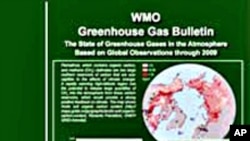Carbon dioxide, methane and nitrous oxide, the main man-made greenhouse gases blamed for global warming, increased to record post-industrial concentrations last year, according to a report by the World Meteorological Organization.
The World Meteorological Organization says the atmospheric gases, stemming mainly from burning fossil fuels, changes in land use and deforestation, continued to rise in 2009.
Impact of economic downturn
Co-Director of the WMO Research Department, Leonard Barrie, says the economic downturn has had an impact on lowering emissions of greenhouse gases over the past two or three years, but not enough to reduce them to zero.
"So, the accumulation in the atmosphere as long as there is an input continues," Barrie said. "Carbon dioxide in the atmosphere is long-lived. That means it would decay away if we stopped emissions now on time scales of 50 years – half lives, 100 years – that sort of thing. Changes that we do on an annual basis or even on a two or three economic crisis time span take awhile to be seen and they are really small changes on top of very large loads in the atmosphere."
Greenhouse gases
Carbon dioxide, methane and nitrous oxide are the most important long-lived greenhouse gases in the atmosphere.
Since 1750, WMO says C02, the most important heat-trapping gas, has increased by 38 percent. Methane has also greatly increased since 1750 due mainly to human activities, such as cattle-rearing, rice planting, fossil fuel exploitation and landfills.
WMO says human activities now account for 60 percent of methane emissions, with the remaining 40 percent being from natural sources such as wetlands.
Concerns
The report highlights concerns that global warming may lead to even greater emissions of methane from Arctic areas. It says northern permafrost contains large reservoirs of organic carbon and methane.
It warns rapid warming and melting of the permafrost have the potential to release large quantities of methane into the atmosphere, which would contribute further to global warming.
The WMO report occurs before envoys from more than 190 nations meet next week in Cancun, Mexico, for negotiations aimed at developing a treaty to fight climate change.








